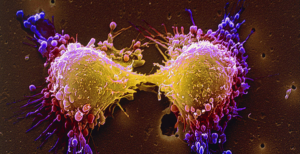 Below is an excerpt from a news article found on leafly.com, Feb 2016:
Below is an excerpt from a news article found on leafly.com, Feb 2016:
Cannabis contains at least 85 different types of cannabinoids, the active chemicals that create drug-like effects throughout the body. The impact of these cannabinoids in treating cancer symptoms as well as the side effects of cancer therapies is so favorable, cannabinoids are synthesized for legal, prescription use. Dronabinol and Nabilone/Cesamet, two synthetic pill forms of THC, are FDA-approved and currently being used to treat nausea and vomiting associated with chemo.
Cannabinoids that are known to benefit people living with cancer include CBC, CBD, CBDa, CBG, THC, and THCa. Cannabidiol (CBD) is known to relieve pain, lower inflammation, and decrease anxiety without the “high” of THC, the primary psychoactive ingredient in cannabis. In Canada, a cannabis extract containing THC and CBD called Nabiximols/Sativex is approved for pain relief in patients with advanced cancer and multiple sclerosis.
According to the U.S. government’s National Cancer Institute, other effects of cannabinoids include anti-inflammatory activity, blocking cell growth, preventing the growth of blood vessels that supply tumors, fighting viruses, and relieving muscle spasms.
NCI also acknowledges that inhaled cannabis is attributed to improved mood and sense of well-being. Studies suggest cannabis can be used for symptom management in cancer patients by preventing vomiting, stimulating appetite, providing pain relief, and improving sleep as well as inhibiting the growth of certain types of tumors.
Other studies leading scientists down promising avenues of cancer treatment include:
- A 1996 study discovered the protective effects of cannabinoids on the development of certain types of tumors. Cannabinoids were observed causing cell death, blocking cell growth, and preventing the development of the blood vessels tumors needed to grow — suggesting cannabinoids may be able to kill cancer cells while protecting normal cells.
- A series of studies on brain tumors conducted in 2003 proved CBD may make chemo more effective and increase the deaths of cancer cells without harming normal cells.
- A 2004 study on mice which showed cannabinoids protect against inflammation of the colon, thus reducing the risk of colon cancer and possibly aiding in its treatment.
- In 2011, the American Association for Cancer Research revealed CBD kills cells associated with breast cancer while having little to no effect on normal breast cells. When studied in mice, CBD reduced the growth, number, and spread of tumors.
- The National Institute of Health published a study in 2011, Cell Death & Differentiation, that demonstrates THC and JWH-015 (a cannabinoid receptor), decreased the viability of liver cancer cells. Cannabinoids were also shown to inhibit tumor growth and the accumulation of fluid in the abdomen. These are significant findings as they may be helpful in the design of therapeutic strategies to manage liver cancer.
- A study published in February 2015 found rates of bladder cancer are 45% lower in cannabis users, compared to those who do not use it.
- According to the National Cancer Institute (NCI), preclinical studies demonstrate the efficacy of cannabinoids to inhibit tumor growth by protecting healthy cells while killing cancer cells and obstructing the growth of cells and blood vessels needed for tumors to grow. The NCI also claims that a lab study of THC killed or damaged cancer cells, and when the study was repeated in mouse models, showed it had anti-tumor effects that could aid in the fight against lung and breast cancer.
Cannabinoid receptors have been discovered in the brain, spinal cord, and nerve endings throughout the body, suggesting cannabis may play a larger role in immunity as well.
Several studies are in progress on the effects of cannabis on cancer in adults, including:
- Treating solid tumors with oral CBD
- Treating recurrent glioblastoma multiform with a THC/CBD oral spray
- Treating graft-versus-host disease with CBD in patients who’ve undergone stem cell transplants
Article source: https://www.leafly.com/news/health/cannabis-and-cancer

![Article: Controversial [Hemp] Cannabis Treatment Helps 9-Year-Old Boy Speak His First Words! Article: Controversial [Hemp] Cannabis Treatment Helps 9-Year-Old Boy Speak His First Words!](http://www.hempoilfacts.com/wp-content/uploads/2016/05/cd-autism-kalel-150x150.jpg)




No Pings Yet